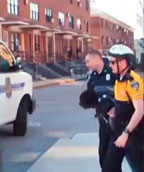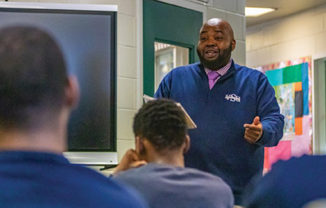 Lawyers discuss police brutality and ways to change paradigm
Lawyers discuss police brutality and ways to change paradigm
Freddie Gray, a 25-year-old Black man who died a week after he was arrested April 12 by Baltimore police, sustained a severe spinal injury while in police custody. (Screen grab courtesy of WJZ-TV)
By Barrington M. Salmon, Special to the NNPA from the Washington Informer
In the past three years, Baltimore residents have filed 317 lawsuits alleging police brutality, and the city has paid out $5.7 million to settle these cases.
It was only after the city exploded into violence after 25-year-old Freddie Gray died in police custody that the scab covering up how some in the Baltimore Police Department has been treating the Black and poor became exposed for the world to see.
On June 11, some of D.C. and Baltimore’s most distinguished legal minds participated in a panel discussion at the D.C. Superior Court to talk about police brutality and harassment and their effects on Black and minority communities.
Criminal defense lawyer and Howard University Adjunct Professor Brandi Harden moderated the animated, feisty 90-minute discussion, which touched on a range of issues that sit at the intersection of race and criminal justice. Participants argued forcefully that the status quo is unsustainable.
“These lawsuits involved police brutality that occurred in the last four years, and this is what we know about,” said Gray’s lawyer, Jason Downs. “If people’s injuries weren’t serious, a law firm might not take the case. This is just in Baltimore City – there are cases all over the country.”
A critical issue, said Downs, is that the police are dealing harshly with a population that is essentially voiceless.
“If someone [who’s white] gets grabbed up, it would be a big deal. Their voice would be heard,” said Downs, an attorney with Baltimore’s Murphy, Malcolm, Murphy, Koch, Xinis. “You won’t be heard in Southeast.”
The issue of blue-brown interaction exploded into the public consciousness when Officer Darryl Wilson fatally shot unarmed 18-year-old Michael Brown in August. Riots broke out following the shooting, and protests and vigils continued in Ferguson, Mo., with marchers demanding justice for Brown.
A grand jury ultimately declined to indict Wilson. Protests broke out in more than 100 cities and 37 states, and since then police behavior has been under intense scrutiny. Across the country, including in Washington, D.C., concern about the extra-judicial killings of Black men and women prompted marches and demonstrations in solidarity with Brown and others.
The names of Mike Brown, Freddie Gray, Renisha McBride, Eric Garner, Tarika Wilson, Oscar Grant, seven-year-old Aiyana Jones, Ezell Ford, Miriam Carey, Jordan Baker, Shereese Francis, Tamir Rice, Trayvon Martin, Tyisha Miller and Jordan Davis are just some of the Black men, women and children killed by police and vigilantes.
Most of the speakers said America’s sordid and tragic racial history has fed into the tremendous latitude police officers have when they use deadly force – that police officers have gotten the approval of the U.S. Supreme Court time after time to maim and kill America’s citizens with impunity and implicit racial bias, racial bias and indifference toward Black people, which exacerbates an already difficult problem.
Lisa Crooms-Robinson, associate dean of academic affairs and a professor of law at Howard University Law School, said that every day the larger society makes choices consciously and otherwise about what constitutes a crime and what elements of the population will be held and punished and how long.
“Part of my feeling about this is that policing is under and over-inclusive,” said Crooms-Robinson.
“We have over-policing and constant surveillance. [Issues] of poverty, unemployment, substance abuse, are erroneously dubbed criminal. Wall Street is a high-crime area. There are different choices in what we think of rewards and being locked up.”
“How many cocaine addicts would you sweep up in Wall Street? People who had jobs there talked about people in bathroom stalls trying to get their heads right. It’s about opportunity and the choices we make about where police are needed. Poor white people are catching hell, as are meth addicts versus the banker downtown who’s stealing peoples’ pensions.”
Crooms-Robinson and several of her colleagues said the crux of this issue is society’s disregard for Black people’s human rights because of what they look like and where they live.





Be the first to comment